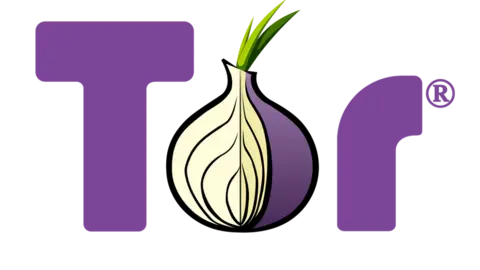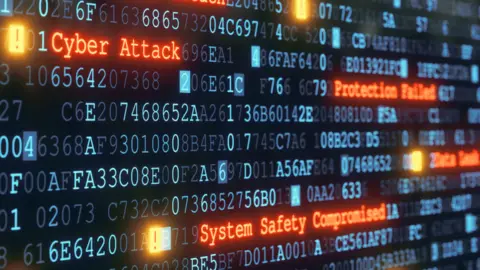Defending Tor - gateway to the dark web
 Tor Project
Tor ProjectWhen Roger Dingledine talks about the dark web, he waves his hands in the air - as if not quite convinced of its existence.
I give him the benefit of the doubt - his arguably blasé attitude, I think, is a symptom of being consistently called upon to defend his creation.
He is the co-creator of Tor, the most popular software available for gaining access to the part of the internet unreachable using a conventional browser - including what is often referred to as the dark or underground web.
To some, Tor is a menace: a (largely) impenetrable system that enables some of the most depraved crimes to take place on the internet.
To others, it is a lifeline, the only way to safely access the online services that most of us take for granted.
Dingledine would rather we talked about the latter. The scale of the dark web - with its drug deals, weapons sales and child abuse imagery - is insignificant when considered in the bigger picture, he argues.
But we must talk about the former. I meet Dingledine at this year's Def Con, the large underground hacking convention held in Las Vegas.
The timing was ideal - the event came just over a week after the closure of two huge dark web marketplaces. The biggest, Alphabay, was said to boast more than 200,000 users and $1bn (£0.7bn) a year in revenue.

Dingledine's talk was the day prior to our meeting, and in it he criticised misinformed journalists for sensationalising the size and scale of the dark web.
"I think a lot of it comes down to incentive mismatches," he tells me, "where journalists have to create more controversy and get something so that everybody will want to read their article.
"The story is privacy is under threat around the world, and that's been the story for a while - so they need a new story."
Abuse
The Tor Project's website has a section called "Abuse FAQ".
It is here the group attempts to address the most controversial side of Tor use: that it is an enabler of criminals intent on carrying out the most shocking and sickening crimes.
When talking about this, Dingledine invokes the "guns don't kill people" defence. Tor does not commit crime, he says, criminals do.
"I would say that there are bad people on the internet and they're doing bad things, but Tor does not enable them to do the bad things.
"It's not like there's a new set of bad people in the world who exist because Tor exists."
I guess not. But I suggest that Tor indisputably provides a way in which a novice can make themselves essentially untraceable online.
"I still think that most of the bad stuff on the internet has nothing to do with Tor," Dingledine insists.
"Most of the bad stuff on the internet is due to huge criminal organisations. There's a lot of crime out there."
Click button policing
In layman's terms, Tor hides your identity by pinging your connection around many different servers across the world, making your actual location extremely hard to track.
There have been rumours that law enforcement has "cracked" Tor but, aside from isolated vulnerabilities, Dingledine says the concept remains solid.
"As far as I know, no, they haven't [cracked Tor].
"Tor is the best option there is out there, but that doesn't mean Tor is perfect. No software is perfect."
Any major busts and arrests have been traced back to human error - good old, old-fashioned policing.
"Which is frustrating," Dingledine interjects, "Because the modern police world wants to just click a button and have the bad guy show up. Old-fashioned police work is hard, takes energy."
Tor was mentioned in the documents leaked as part of Edward Snowden's whistleblowing in 2014. Under the delicate heading "Tor Stinks… but it could be worse", the National Security Agency (NSA) noted: "We will never be able to de-anonymise all Tor users all the time."
Given this, you would think the US (and others) would be taking every step to weaken Tor. Ban it, even. But in fact, the US government has done more than any other to keep it alive - donating several million dollars to Dingledine and team since the project's inception in the nineties.
He is confident that funding will continue.
"A lot of the US government funding for internet freedom tools comes from Republicans. The current congress is quite supportive of giving people tools to keep people safer on the internet."
The reason? The FBI, CIA, military and others all value anonymity too. In their ideal world, Tor would exist, but they would hold a secret key to break in.
Good uses
In 2014, Facebook's London team announced it had set up a way for users to access Facebook through Tor. More than a million people use the site in this way every month.
 Getty Images
Getty Images"About 97% of Tor traffic has to do with people going to Facebook, and Wikipedia, and BBC, and ordinary websites on the internet, and they want to go there more safely," Dingledine says.
"Whereas 3% of the traffic has to do with this 'dark web' thing…. I have to wave my hands when I say the phrase."
The ability to access social networks anonymously is invaluable to people living in oppressive regimes or countries with high levels of surveillance around what citizens do online.
But given the majority of users can be found in the US and Europe - in places not typically considered to be oppressive - I argued that Tor's justification hinging on the needs of activists perhaps seems less than convincing.
"I think the line is getting a lot more blurry between the free countries, and the un-free countries," he says.
___________
Follow Dave Lee on Twitter @DaveLeeBBC
You can reach Dave securely through encrypted messaging app Signal on: +1 (628) 400-7370
